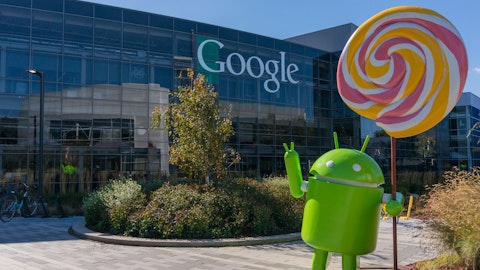Investors, as well as, the tech community was surprised yesterday after Google Inc (NASDAQ:GOOGL) announced its reorganization plans, under which it will create a new holding company, called Alphabet and will separate its Internet division, which will include Google’s core businesses, such as search, Android, YouTube and several other services, and the rest of its activities, such as IoT platform NEST, venture capital arm, Google X and other segments. Following the reorganization, Google’s stock, or better to say, Alphabet’s stock, will keep trading under the existing tickers GOOG and GOOGL, but the company will change the structure of its financial reporting and will present the results for each division separately. Moreover, each division of Alphabet will have its own CEO and the holding company will be led by Larry Page, while Google, which will be the largest part of the new conglomerate, will be managed by its new executive Sundar Pichai.

However, what’s more important is whether these changes will benefit the investors. In their statement that was published on Alphabet’s new website (https://abc.xyz/), Google Inc (NASDAQ:GOOGL)’s co-founders Larry Page and Sergey Brin said that one of the reasons for choosing the name Alphabet is because it represents “Alpha-bet”, where alpha stands for the risk ratio that measures the return of an investment compared to a benchmark. Moreover, the market reacted positively to the news about Google’s restructuring and both class A and class C stocks jumped by 5% in pre-market trading and extended the gains after the market opened.
The restructuring of Google Inc (NASDAQ:GOOGL) under Alphabet will benefit the shareholders in many ways. However, the company will most likely not change its current voting structure, under which Page and Brin retain the majority of voting powers (around 56%). Nevertheless, the new structure will provide investors with more information regarding Google’s operations and its R&D expenses on different huge projects. After Alphebet starts reporting its financial results in two parts, one for Google and one for the rest of the company, shareholders will be able to assess the company’s operations in a more distinct way. But, since the non-Google division of Alphabet will include a vast majority of projects on which Brin and Page embarked in the last years, it will still be difficult to see which projects bring money into the firm and which drain funds in R&D expenses.
With this in mind, it will be interesting to see if the new structure under Alphabet will change the hedge fund sentiment regarding the company. So far, investors are deeply underweight on Google, as they own less than 2% of each of the two classes of stock. One of the reasons for that could be that the stock is too expensive, or it could be because of the company’s voting structure, which doesn’t allow shareholders to push for changes in order to increase the company’s profitability. Nevertheless, Google is one of the most popular stocks among our pool of over 700 hedge funds and at the end of March 121 investors disclosed holding $7.36 billion worth of class A stock and 108 funds held $6.88 billion in class C shares.
We consider the hedge fund sentiment an important metric while assessing investment opportunities, because our research showed that, while hedge funds underperform the market in general, some of their individual stock picks are capable of generating impressive returns. However, we focus mostly on hedge funds’ small-cap ideas, because we determined that this group of stocks has the highest profitability in their equity portfolios. More specifically, in backtests our portfolio of 15 most popular small-cap stocks among hedge funds managed to beat the market by nearly one percentage point per month, while 50 mid- and large-cap picks underperformed broader indices by an average of seven basis points. Moreover, since we started tracking our strategy in real-time in August 2012, our portfolio of small-cap stocks has returned more than 123% and outperformed the S&P 500 ETF (SPY) by some 65 percentage points (read more details here).
A closer look at our data show that among the largest shareholders of Google Inc (NASDAQ:GOOGL) among the funds from our database are Andreas Halvorsen‘s Viking Global, which owned 1.64 million class A shares and 841,200 shares of class C stock and Boykin Curry’s Eagle Capital Management with 760,200 shares and 1.14 million shares of Class A and class C stocks, respectively. Other investors with long positions include Mason Hawkins’ Southeastern Asset Management, Ken Fisher’s Fisher Asset Management, and Lee Ainslie’s Maverick Capital.
Google Inc (NASDAQ:GOOGL) managed to please investors with its latest financial report in mid-July, which indicated revenue of $17.73 billion, up by 11% on the year, while its operating profit advanced by an annual 27% to $4.8 billion. As the company also managed to beat the estimates, the stock, which has been lagging until July, gained more than 10% on the back of earnings results. However, despite the gain on the back of earnings beat, the company still has a long way to go to convince smart money to be more bullish.
The new structure will make Alphabet look more like Warren Buffett‘s Berkshire Hathaway and will allow investors to get a better idea about the company from its balance sheet and income statements. Maybe this will be the move that will change hedge funds’ idea about the stock. But to see that, we have to wait until Google will report its first results under the new structure and analyze 13F filings along the way.
Disclosure: none





